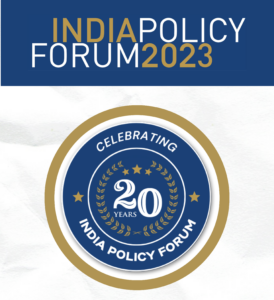Ideas@IPF2023 series: NCAER’s India Policy Forum – where research meets policy
10 Jul 2023
Opinion: Anupma Mehta.
 Every year, the National Council of Applied Economic Research (NCAER) hosts the India Policy Forum (IPF), a platform where economists and policymakers dissect five research ideas for their utility to public policy. To commemorate the 20th anniversary of the conference, Ideas for India launches the Ideas@IPF2023 series, introduced in this anchor by NCAER’s Anupma Mehta. Across this week, from 10-14 July, we will host five articles summarising cutting-edge empirical work at the intersection of economics and policy.
Every year, the National Council of Applied Economic Research (NCAER) hosts the India Policy Forum (IPF), a platform where economists and policymakers dissect five research ideas for their utility to public policy. To commemorate the 20th anniversary of the conference, Ideas for India launches the Ideas@IPF2023 series, introduced in this anchor by NCAER’s Anupma Mehta. Across this week, from 10-14 July, we will host five articles summarising cutting-edge empirical work at the intersection of economics and policy.
The India Policy Forum, a marquee event hosted annually by the National Council of Applied Economic Research (NCAER) has, over the years, acquired a distinctive character as an interactive platform where research and policy converge to foster meaningful socioeconomic outcomes for the country. The fact that the IPF routinely attracts eminent participants from the policy, research, and academic space is a testament to the mission and objectives of the conference. The intellectual exchange of ideas at platforms such as the IPF also drives NCAER’s mandate of ensuring ‘Quality, Relevance, and Impact’ through its work.
The 2023 edition of the IPF, held on 6 and 7 July, has been especially significant as it marked the 20th anniversary of the conference, which had since the very outset been conceptualised as a veritable meeting place for evaluation of Indian economic and social policies. The papers that found a voice at IPF 2023 represent a wide spectrum of subjects: including the ramifications of rising public debt, implications of widespread electrification, investment in skills for productivity, son preference as a fertility trend, and trajectory of the finance system in India.
In their paper, ‘Is electrification in India fiscally sustainable?’, Prabhat Barnwal and Nicholas Ryan examine the fiscal health of state electricity distribution companies in India, and how this affects the supply of electricity in the country, especially as state discoms continue to record losses in both transmission and revenue.
Another paper, ‘How worker investments can fuel productivity in India’s manufacturing sector’, by the team of Achyuta Adhvaryu, Smit Gade, Anant Nyshadham, Sandhya Srinivas, and Jean-Francois Gauthier, establishes stylised facts and flags the slowdown in aggregate productivity growth in India’s manufacturing sector over the last several years. The authors posit that under-investment in workers by firms could be a major reason for inadequate productivity across companies.
The paper ‘An overview of (elder) son preference in India’, by Seema Jayachandran, mainstreams the issue of persistent gender discrimination, manifested in the preference for male children over their female counterparts in most parts of the country, and how it plays out through both differential investment in sons over daughters and a fertility preference to have male children.
In their paper, ‘India’s debt dilemma’, Barry Eichengreen, Poonam Gupta, and Ayesha Ahmed highlight the prevalence of high fiscal deficit and public debt in India. This necessitates measures like fiscal consolidation by achieving lower primary deficits through greater generation of tax revenue and privatisation. They also assess the sustainability of public finances, with a focus on the next five years.
The final paper presented at the IPF, ‘The past and future of Indian finance’, written by Ruchir Agarwal, locates the financial crisis faced by India during 2018-20 within the context of its growth story. He analyses the fiscal slowdown in the country commencing in 2018, signified by a serious decline in its GDP, and recession in various sectors of the economy. The paper also outlines the various steps taken to strengthen India’s financial system in an effort to safeguard it from future fiscal crises.
These papers thus not only diligently mirror the crucial developments in India’s socioeconomic landscape but also use robust data, analysis, and empirical research to chart the future trajectory of action that would help policymakers navigate the challenges and optimise the opportunities for ensuring sustained economic growth in the country.
Over the course of this week, each of the papers presented at IPF 2023 will be shared on Ideas for India, in collaboration with NCAER. We hope that these will generate greater debate and discussion on pivotal economic issues.
Published in: Ideas for India, 10 Jul 2023






 Every year, the National Council of Applied Economic Research (NCAER) hosts the India Policy Forum (IPF), a platform where economists and policymakers dissect five research ideas for their utility to public policy. To commemorate the 20th anniversary of the conference, Ideas for India launches the Ideas@IPF2023 series, introduced in this anchor by NCAER’s Anupma Mehta. Across this week, from 10-14 July, we will host five articles summarising cutting-edge empirical work at the intersection of economics and policy.
Every year, the National Council of Applied Economic Research (NCAER) hosts the India Policy Forum (IPF), a platform where economists and policymakers dissect five research ideas for their utility to public policy. To commemorate the 20th anniversary of the conference, Ideas for India launches the Ideas@IPF2023 series, introduced in this anchor by NCAER’s Anupma Mehta. Across this week, from 10-14 July, we will host five articles summarising cutting-edge empirical work at the intersection of economics and policy.